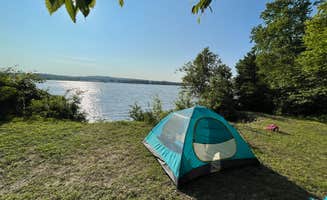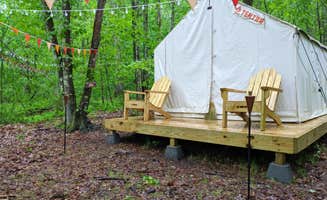Tent camping near Ledyard Center, Connecticut offers several primitive and backcountry options within the Connecticut River watershed. The region receives an average of 47 inches of rainfall annually with summer temperatures typically ranging between 65-85°F. Most riverside tent campsites experience morning fog patterns during summer months, particularly in June through August, creating challenging visibility conditions for early morning departures.
What to do
Paddle exploration: From Chapman Pond Preserve, campers can access multiple coves and inlets along the Connecticut River. The site offers tent platforms with views of the river, though limited amenities. "Middle of no where site. Good tent platforms, picnic tables and outhouse. CT river within view," notes camper Ben L. about the Chapman Pond Preserve.
Fishing access: River Highlands State Park River Campground provides direct shoreline fishing opportunities for bass and catfish. "The campsite was absolutely beautiful—especially with its location right by the river," reports Alicia B. about the River Highlands State Park River Campground.
Historical tours: Multiple tent camping options near Gillette Castle State Park allow visitors to combine backcountry camping with historical exploration. "Castle has tours at certain times," notes Todd J. regarding the historical attractions at Gillette Castle State Park Campground.
What campers like
River sunrises/sunsets: The Connecticut River corridor provides optimal east/west views for watching daybreak and nightfall. "You can swim and fish and relax all day! It is amazing with the views of the CT River and being able to watch the sunrise and sunset," explains Jackie G. about her experience at Gillette Castle State Park.
Private settings: Hidden Lake Farm provides a more developed but still secluded tent camping option with basic amenities. The campground offers five individual tent sites with more facilities than most primitive options. "Quiet and Private," mentions Ashley F. about Hidden Lake Farm.
Beach access: Many river campsites offer access to small beaches at low tide. River access points provide swimming opportunities directly from camping areas without requiring travel to designated beaches. Campers frequently mention water access as a primary benefit of riverside camping locations near Ledyard Center.
What you should know
Boat-in requirements: For the best tent camping near Ledyard Center, Connecticut, particularly at boat-in sites, adequate paddling equipment and experience are essential. Deep River Landing boat launch serves as the primary access point for crossing to island camping areas. A typical crossing takes approximately 20 minutes under normal conditions.
Seasonal permits: Memorial Day through Labor Day requires special permits at many boat launch areas that provide access to riverside tent camping. These permits must be obtained in advance and displayed on vehicles.
Wildlife considerations: Tent campers should be prepared for encounters with local wildlife, including insects. "As a heads-up, the outhouse did have quite a few wolf spiders (which might be expected in a natural setting like this)," warns Alicia B. about her experience at River Highlands State Park River Campground.
Tips for camping with families
Site selection: For families seeking primitive tent camping near Ledyard, select sites with moderate river access rather than high-bank areas. Low-slope beach access points provide safer water entry for children.
Weather monitoring: Connecticut River valley fog can delay morning departures from island campsites by several hours. Always plan departure times with weather patterns in mind, especially when camping with children who may become restless during weather delays.
Supply planning: Boat-in camping requires careful consideration of water and supply needs. Multiple campers note the importance of bringing adequate drinking water for the duration of stay at primitive sites like Selden Neck State Park Campground, where no potable water sources exist.
Tips from RVers
Alternative options: No RV camping exists on the islands or primitive riverside areas near Ledyard Center. RV campers seeking proximity to these natural areas should consider established campgrounds in nearby towns.
Day-use strategies: RV travelers can utilize boat launches at Deep River Landing for day trips to islands and primitive areas. This approach allows exploration of remote tent camping areas while maintaining access to RV amenities. Parking is limited at most river access points, so arrive early during peak season.
Equipment considerations: For RVers who also tent camp, consider sites with dedicated parking areas and boat/kayak storage options. This combination allows for establishing a base camp with the RV while utilizing tent sites for overnight exploration of more remote areas.



